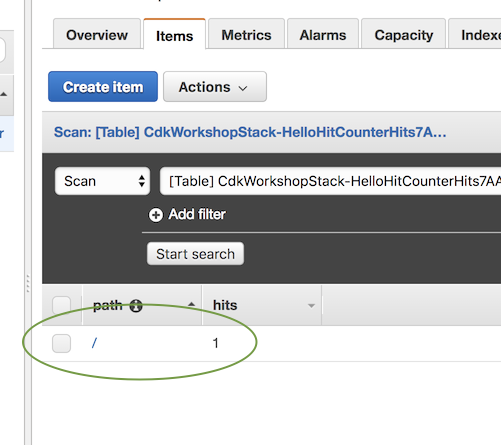Allow Lambda to read/write our DynamoDB table #
Let’s give our Lambda’s execution role permissions to read/write from our table.
Go back to hitcounter.py and add the following highlighted line:
from constructs import Construct
from aws_cdk import (
aws_lambda as _lambda,
aws_dynamodb as ddb,
)
class HitCounter(Construct):
@property
def handler(self):
return self._handler
def __init__(self, scope: Construct, id: str, downstream: _lambda.IFunction, **kwargs):
super().__init__(scope, id, **kwargs)
table = ddb.Table(
self, 'Hits',
partition_key={'name': 'path', 'type': ddb.AttributeType.STRING}
)
self._handler = _lambda.Function(
self, 'HitCountHandler',
runtime=_lambda.Runtime.PYTHON_3_7,
handler='hitcount.handler',
code=_lambda.Code.from_asset('lambda'),
environment={
'DOWNSTREAM_FUNCTION_NAME': downstream.function_name,
'HITS_TABLE_NAME': table.table_name,
}
)
table.grant_read_write_data(self._handler)Deploy #
Save & deploy:
cdk deploy
Test again #
Okay, deployment is complete. Let’s run our test again (either use curl or
your web browser):
curl -i https://xxxxxxxxxx.execute-api.us-east-1.amazonaws.com/prod/
Again?
HTTP/1.1 502 Bad Gateway
...
{"message": "Internal server error"}
😢 #
Still getting this pesky 5xx error! Let’s look at our CloudWatch logs again (click “Refresh”):
{
"errorMessage": "User: arn:aws:sts::585695036304:assumed-role/hello-cdk-1-HelloHitCounterHitCounterHandlerS-TU5M09L1UBID/hello-cdk-1-HelloHitCounterHitCounterHandlerD-144HVUNEWRWEO is not authorized to perform: lambda:InvokeFunction on resource: arn:aws:lambda:us-east-1:585695036304:function:hello-cdk-1-HelloHandler2E4FBA4D-149MVAO4969O7",
"errorType": "AccessDeniedException",
"stackTrace": [
"Object.extractError (/var/runtime/node_modules/aws-sdk/lib/protocol/json.js:48:27)",
"Request.extractError (/var/runtime/node_modules/aws-sdk/lib/protocol/rest_json.js:52:8)",
"Request.callListeners (/var/runtime/node_modules/aws-sdk/lib/sequential_executor.js:105:20)",
"Request.emit (/var/runtime/node_modules/aws-sdk/lib/sequential_executor.js:77:10)",
"Request.emit (/var/runtime/node_modules/aws-sdk/lib/request.js:683:14)",
"Request.transition (/var/runtime/node_modules/aws-sdk/lib/request.js:22:10)",
"AcceptorStateMachine.runTo (/var/runtime/node_modules/aws-sdk/lib/state_machine.js:14:12)",
"/var/runtime/node_modules/aws-sdk/lib/state_machine.js:26:10",
"Request.<anonymous> (/var/runtime/node_modules/aws-sdk/lib/request.js:38:9)",
"Request.<anonymous> (/var/runtime/node_modules/aws-sdk/lib/request.js:685:12)"
]
}
Another access denied, but this time, if you take a close look:
User: <VERY-LONG-STRING> is not authorized to perform: lambda:InvokeFunction on resource: <VERY-LONG-STRING>"
So it seems like our hit counter actually managed to write to the database. We can confirm by going to the DynamoDB Console:

But, we must also give our hit counter permissions to invoke the downstream lambda function.
Grant invoke permissions #
Add the highlighted lines to cdk_workshop/hitcounter.py:
from constructs import Construct
from aws_cdk import (
aws_lambda as _lambda,
aws_dynamodb as ddb,
)
class HitCounter(Construct):
@property
def handler(self):
return self._handler
def __init__(self, scope: Construct, id: str, downstream: _lambda.IFunction, **kwargs):
super().__init__(scope, id, **kwargs)
table = ddb.Table(
self, 'Hits',
partition_key={'name': 'path', 'type': ddb.AttributeType.STRING}
)
self._handler = _lambda.Function(
self, 'HitCountHandler',
runtime=_lambda.Runtime.PYTHON_3_7,
handler='hitcount.handler',
code=_lambda.Code.from_asset('lambda'),
environment={
'DOWNSTREAM_FUNCTION_NAME': downstream.function_name,
'HITS_TABLE_NAME': table.table_name,
}
)
table.grant_read_write_data(self._handler)
downstream.grant_invoke(self._handler)Diff #
You can check what this did using cdk diff:
cdk diff
The Resource section should look something like this, which shows the IAM statement was added to the role:
Stack cdk-workshop
The cdk-workshop stack uses assets, which are currently not accounted for in the diff output! See https://github.com/awslabs/aws-cdk/issues/395
IAM Statement Changes
┌───┬────────────────────────┬────────┬────────────────────────┬────────────────────────┬───────────┐
│ │ Resource │ Effect │ Action │ Principal │ Condition │
├───┼────────────────────────┼────────┼────────────────────────┼────────────────────────┼───────────┤
│ + │ ${HelloHandler.Arn} │ Allow │ lambda:InvokeFunction │ AWS:${HelloHitCounter/ │ │
│ │ │ │ │ HitCounterHandler/Serv │ │
│ │ │ │ │ iceRole} │ │
└───┴────────────────────────┴────────┴────────────────────────┴────────────────────────┴───────────┘
(NOTE: There may be security-related changes not in this list. See http://bit.ly/cdk-2EhF7Np)
Resources
[~] AWS::IAM::Policy HelloHitCounter/HitCounterHandler/ServiceRole/DefaultPolicy HelloHitCounterHitCounterHandlerServiceRoleDefaultPolicy1487A60A
└─ [~] PolicyDocument
└─ [~] .Statement:
└─ @@ -24,5 +24,15 @@
[ ] "Ref": "AWS::NoValue"
[ ] }
[ ] ]
[+] },
[+] {
[+] "Action": "lambda:InvokeFunction",
[+] "Effect": "Allow",
[+] "Resource": {
[+] "Fn::GetAtt": [
[+] "HelloHandler2E4FBA4D",
[+] "Arn"
[+] ]
[+] }
[ ] }
[ ] ]
Which is exactly what we wanted.
Deploy #
Okay… let’s give this another shot:
cdk deploy
Then hit your endpoint with curl or with your web browser:
curl -i https://xxxxxxxxxx.execute-api.us-east-1.amazonaws.com/prod/
Output should look like this:
HTTP/1.1 200 OK
...
Hello, CDK! You've hit /
If you still get 5xx, give it a few seconds and try again. Sometimes API Gateway takes a little bit to “flip” the endpoint to use the new deployment.